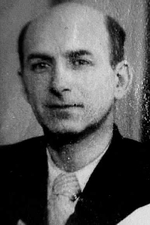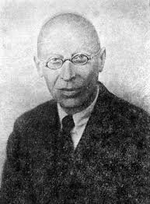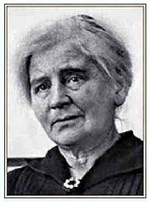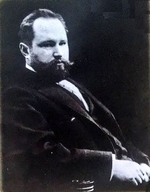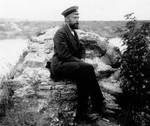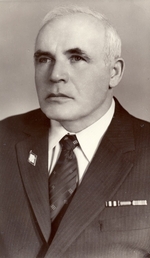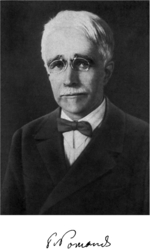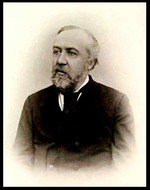Articles
Ramm Boris (1902–1989)
Ramm Boris (1902–1989) – historian medievalist, specialist in the history of Catholicism.
He was born in the town of Starodub (Chernigov Region); in 1920, he graduated from the Historical Faculty of the Leningrad State University. In 1924-1937, he was lecturer in the Department of the Mass Work of Lensovet. In 1931-1933, he was Docent of Volodarsky Institute of Propaganda in Leningrad. In 1937-1939, he taught at the Chair of the World History of the Voronezh State Teachers-Training Institute. In 1938, he defended his Candidate thesis in History at the Leningrad State University; his work was ‘Laic and Ecclesiastic Elements in the Culture of the Early Middle Ages’.
Read More
Ranovich (Rabinovich) Abraham (1885–1948)
Ranovich (Rabinovich) Abraham (1885–1948) – historian of Classical epoch, Early Christianity, and Judaism.
He was born in the family of a small clerk. In 1905, he enrolled to the Physical and Mathematical Faculty of the Kievan St Vladimir University. In 1907, he was arrested for anti-tzarist propaganda. After he was released from the jail, R. transferred to the Historical and Philological Faculty; in 1913 he graduated from it with the silver medal (the graduation paper on Apollonius of Tyana).
Read More
Ratner-Shternberg Sarra (1870–1942)
Ratner-Shternberg Sarra (1870–1942) – etnographer.
She was born in Mogilev in a merchant’s family. In 1886, after the Mogilev female gymnasium, she enrolled to the Bestuzhev High Female Courses in St. Petersburg. After four years at the Physical and Mathematical Department, she graduated with honors. In early 1890-s, she taught at the courses for female workers at the Society for Dissemination of Enlightenment among Jews. Later, she organized 4-years courses for Jewish girls in Zhitomir. At the same time she participated in the work over the Encyclopedic Lexicon Granat, write articles on geography.
Read More
Reisner Mikhail (1868–1928)
Reisner Mikhail (1868–1928) – Russian lawyer, journalist, religious sociologist.
In 1892, he graduated from the University of Warsaw, where he studied at classes of Professors A. L. Block, and E. N. Trubetskoy. In 1898-1903, he was Ass. Professor at the Chair of Political Economy, and later at the Chair of the State Law of the Legal Faculty of the Tomsk University, where he combined pedagogical and social activity with his research work. He was interested in the problem of balance between right, moral, and religion, as well as the problem of the relations between state and church – the ‘ecclesiastic police’ in Russian and in the West Europe. The results of his research were to be form a thesis on the position of the state to a believer; they were published in a cycle of articles, where he interpreted the links of right, moral, religion in the Russian legal system; he studied concepts of the freedom of conscience and freedom of confession (he treated them as inextricably linked, because, on his opinion, the ethic basics of the freedom of conscience demanded the legal principle of the freedom of confession); and also the religious tolerance in the past and present on the base of existing Russian and European laws.
Read More
Repnikov Nickolay (1882–1940)
Repnikov Nickolay (1882–1940) – archeologist, historian.
In 1900, after a commercial school, he enrolled to the Historical and Philological Faculty of the St. Petersburg University. Being student, he started to work for the Archeological Commission and for the Russian Archeological Society.
After graduating the University in 1910, till 1914, he was Curator of the Archeological collection of the Ethnographical Department of the Russian Museum. After the Revolution 1917, he worked at the State Academy of the History of Material Culture. He studied archeological monuments of the North-West of Russia. He made preliminary evaluation of sites, organized excavations of mounds, made a map of zhal’niks (ancient burial mounds) with their descriptions, studies places of sacrifices.
Read More
Rizhsky Mikhail (1911–2000)
Rizhsky Mikhail (1911–2000) – Biblical historian, specialist in the history of the Ancient World, archeologist.
He was born in a religious Jewish family; he got the primary education in kheder. In 1928, he finished Soviet secondary school (10 years), after it he worked as miner in Donbas, as worker at the Nevsky Engineering Lenin Plant in Leningrad. In 1931-1933, he studied at the Leningrad Physical and Mathematical Institute, then was mobilized and till 1935 served in the Army at the Far East. After the demobilization, he entered the second year of the Physical and Mathematical Faculty of the Moscow State University by correspondence; in 1936, he transferred at the second year of the Historical Faculty of the Moscow State University, and graduated from it with honors in 1941.
Read More
Romanov Boris (1889–1957)
Romanov Boris (1889–1957) – historian.
In 1912, he graduated from the Historical and Philological Faculty of the St. Petersburg University. After it, he stayed at the chair to prepare himself for the Professor position.
In 1918-1929, he worked at the Central Archive (Main Archive); since 1925, he was there Deputy Chief Manager of Economical Section, and Deputy Head of the Archival Deposit for People’s Economics, Common Life, Culture and Law; in 1928, he became Head of the First Economical Department.
In 1927-1930, he worked at the Leningrad Institute of Marxism.
Read More
Rosen Victor (1849–1908)
Rosen Victor (1849–1908) – specialist in Arabic studies.
He enrolled to the Faculty of Oriental Languages of the St. Petersburg University in 1866, at the age of 17. At the moment, there was the second year of teaching by V. F. Girgas, who had just defended Doctor thesis on the rights of Christians in the east according the Moslem law (1865). R. passed training in Leipzig (1870), at the greatest Philologist-Arabist G. Fleischer. Soon after it, he defended his Master thesis ‘Old Arabic Poetry and Its Criticism’ (1872). After it, R. got a position of Docent at the St. Petersburg University; since autumn, he started teaching at the first years. In 1870-s, R. and Girgas gathered materials for the manual in Arabic grammar and additional educative materials. That cooperation has been fruitful for 14 years, till the death of Girgas in 1887.
Read More
Rosenberg Otton (1888–1919)
Rosenberg Otton (1888–1919) – specialist in Japanese and Buddhist studies.
In 1911, he graduated from the Oriental Faculty of St. Petersburg University; his supervisor was F. I. Shcherbatskoy. After graduation, R. taught at the University, worked at the Asian Museum. He passed training in China and Japan. He wrote several research and popular articles, composed two dictionaries, and prepared a still actual book ‘Problems of Buddhist Philosophy’ (1918). His early death prevented him from further achievements.
He declared a principle of considering Buddhism from the points of systematic and key meanings, i.e. as a complicated structure, which included phenomena of various levels – from popular religion to scholastic philosophy.
Read More
Rosental Nickolay (1892–1960)
Rosental Nickolay (1892–1960) – historian medievalist, historian of religion.
After the Tenishev School, he enrolled to the Historical Department of the Historical and Philological Faculty of the St. Petersburg University. He graduated from it in the spring 1914, and stayed at the Chair of the World History. He was a member of the Religious and Philosophical Society, and wrote for the newspaper ‘Birzhevye vedomosti’. In 1918-1919, as a member of the Constitutional Democratic Party (CD), he was twice under the arrest. After 1919, he completely left the political activity.
In 1922, at the Petrograd University, he defended his Candidate thesis ‘Julian the Apostate. Tragedy of a Religious Person’.
Read More
Showing 241-250 of 351 items.

